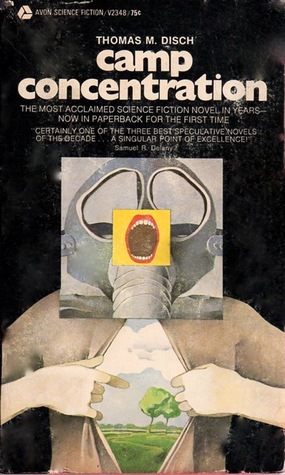Camp Concentration (1968) by American author Thomas Disch first caught my eye with its title, which caused my Jew-dar to go off. Could this be an offensive Sci-Fi take on a Holocaust narrative?, I wondered, with mild horror. The cover art and the non-Jewish sounding name of the author seemed to suggest, “Maybe.” I figured it was my duty as a Jew to find out. After skimming the first few pages, I came to the conclusion that the book was not in fact a science fiction interpretation of the Holocaust, but a story vaguely about the Vietnam War—-the title simply appeared to be a play on words. My interest nevertheless piqued, I bought the book.
Camp Concentration is written as a series of diary entries from the pen of a man named Louis Sacchetti, who has been imprisoned in a mysterious military camp for being a conscientious objector to an unnamed conflict (implied to be the Vietnam War). Sacchetti, a writer, was specially selected for his intelligence, which the camp directors seek to maximize as part of an experimental program. He is one of several subjects who is injected with a type of syphilis that is meant to enhance mental strength, but also causes deterioration of the physical form. The novel tracks Sacchetti’s strange experiences with fellow prisoners and his gradual devolution into insanity. Explored in Camp Concentration are themes of future wars, contagion, and the mad scientist. I would classify the book as soft science fiction, as it is focused more on the psychology of its characters (“inner space”) than the technology behind the camp’s experiments.
I didn’t love this book, but Samuel Delaney and Ursula K. LeGuin did, at least according to the quotes featured on the book’s jacket, so maybe I just don’t have taste. I found the book to be a bit tedious—the flowery language and abundant esoteric references are no doubt purposeful given that the narrator is supposed to be a tortured writer, but they make for difficult reading. Camp Concentration is also alarmingly racist at times—one of the main characters, who is black, is at multiple points given a minstrel-like description, for example. Overall, I would say that this book doesn’t merit the description of “Artful and brilliant,” which one of the cover quotes confers to it. I would not recommend it.
I honestly had a better time reading about the author, Thomas Disch, then I did reading this book. One of my favorite things that I learned was that Disch had a weird feud with Philip K. Dick, who was Disch’s friend before he wrote a paranoid letter to the FBI that slandered Disch and implied that there were seditious coded messages in Camp Concentration. In his last novel, The Word of God, Disch got back at Dick with a story in which Dick is in Hell suffering from writer’s block and makes a Devil’s Bargain to go back in time so he can write again. Dick winds up killing Disch’s dad and changing history so that Hitler wins World War II. Many years following the publishing of The Word of God, Disch also wrote a blog post in which, referring to Dick, he says, “May he rot in hell, and may his royalties corrupt his heirs to the seventh generation” (“Thomas Disch”). Damn.
Bibliography:
Disch, Thomas. Camp Concentration. 1968. Avon Books, 1971.
“Thomas M. Disch.” Wikipedia, 30 Apr. 2022. Wikipedia, https://en.wikipedia.org/w/index.php?title=Thomas_M._Disch&oldid=1085371257.


Wow– I did not know the Disch-Dick feud. Nuts , but not uncommon in the world of artists. Strange to think that a syphilis variant could have any good side effects. And interesting that the protagonist is named Sacchetti… there must be a reason– a fusion of the anarchists Sacco and Vanzetti who are executed in New Orleans? There are many references to esoteric thought in the novel, as well as erudite and experimental writing (it was first published serially in Moorcock’s _New Worlds_ magazine); that’s probably why it appealed to Le Guin and Delaney.